The products and services mentioned below were selected independent of sales and advertising. However, Simplemost may receive a small commission from the purchase of any products or services through an affiliate link to the retailer's website.
Oh, menopause. You just keep on giving gifts to women that we don’t want yet can’t exchange.
Hot flashes, mood swings, insomnia and irregular periods are only a few of the well-documented, common side effects women contend with during this time. Women may also experience dry, itchy skin during menopause. This condition may come as a surprise when discomfort begins, because itchy skin is not one of the more commonly discussed symptoms of menopause.
Understanding the causes of dry, itchy skin during menopause can help prepare women for its arrival, and equip them with the best ways to find relief when it happens.
Why Is Skin Itchy During Menopause?

Menopausal symptoms occur as a result of changing hormone levels. The skin is not immune to the hormonal havoc taking place inside the body.
Dr. Dawn M. Ericsson, board-certified obstetrician and gynecologist, explained to Simplemost why skin changes during menopause.
“During menopause, the level of estrogen decreases greatly as ovarian production of this hormone sharply declines,” Ericsson said. “Estrogen plays a vital role in skin health by supporting the production of collagen and natural oils. Collagen is a protein that maintains elasticity and skin integrity along with natural oils that support skin moisture.”
Dr. Alyssa Dweck, chief medical officer at Bonafide Health, discussed the body’s declining production of hyaluronic acid as a factor in the skin’s increased dryness.
“Hyaluronic acid is a super moisturizer with [the] ability to retain many times its water,” she said.
When collagen, natural oils and hyaluronic acid decrease, the skin cannot hold onto moisture the way it did in youth. This leads to drier, thinner skin, which results in the unpleasant itchy sensation known clinically as pruritus.
MORE: The best cooling pajamas for menopause
The most common areas women develop dry, itchy skin during the transitional period anywhere from perimenopause until after menopause are the face, neck, arms and chest. However, it is not unusual for pruritus to affect the back, lower limbs and vagina.
Dermatologist Dr. Beth Goldstein told Simplemost via email that pruritus typically shows up as “redness, flaking and increased skin sensitivity to the sun and even clothes against the skin.”
“It’s no surprise that this sensation can make daily life and sleep life unpleasant,” she said. “In fact, pruritus combined with menopausal night sweats is particularly challenging.”
Goldstein also said approximately 50 to 65 percent of women from the perimenopausal phase through post-menopause (after age 55) will likely experience this symptom.
Although dry, itchy skin during menopause may be inevitable for many women, fortunately, there are ways to help alleviate the discomfort, thanks to various treatments.
How To Stop Itchy Skin During Menopause
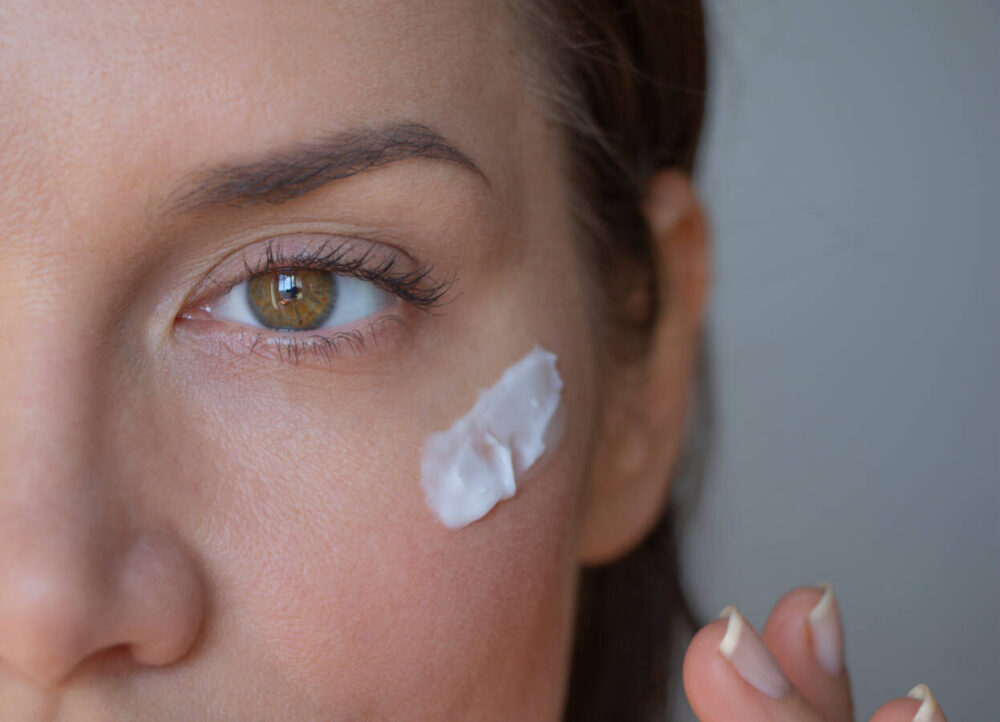
When asked about how to stop itchy skin during menopause, the doctors we spoke with emphasized treatments that focused on addressing the source of the skin problem to help keep the skin moisturized, as well as how to reduce the actual itching. They shared a variety of options to help women feel more comfortable in their skin.
Whether you’re looking for a simple, inexpensive home remedy, a new skincare routine or even medical intervention, we’ve rounded up their recommendations on how to stop itchy skin during menopause.
Home Remedies For Itchy Skin
Looking for some basic daily habits to relieve your dry, itchy skin? There are a number of home remedies to increase your skin’s moisture and fight off the itch.
One home remedy you may have heard of to stop itching is an oatmeal bath. Typically used to help with the itching of poison ivy, eczema and other skin rashes, an oatmeal bath can help ease menopausal women’s discomfort, according to Dr. Dweck.
She recommends using a colloidal oatmeal soak, which takes the pantry staple oats you have in the kitchen and grinds them into a fine powder. By grinding the oats into an easily dissolvable powder, all of the vitamins, lipids (natural moisturizers) and antioxidants can enter the skin and provide protection and relief.
You can take your old-fashioned oats and grind them up yourself to make colloidal oatmeal. Or, you can purchase Aveeno Soothing Bath Treatment, made with 100 percent natural colloidal oatmeal to just drop in your bathtub whenever needed.
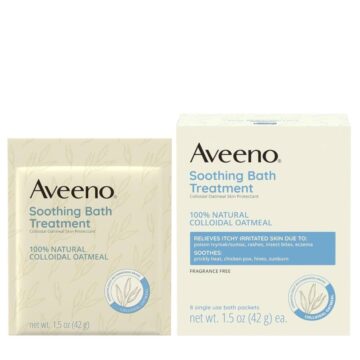
Using cold compresses can help minimize the discomfort of hot flashes and sweating, which can often lead to making the itching feel worse. You can soothe those hot flashes in the neck and shoulders area with a reusable, wearable cold pack like this one from Walmart.
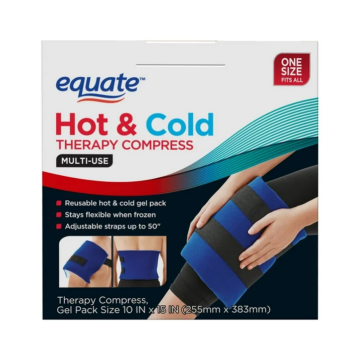
Good hydration can also help prevent or reduce dry skin by stopping dehydration at the source. Our body’s dehydration comes not only from not drinking enough water, but from excess perspiration women experience during perimenopause and menopause.
So, dig out that water bottle or treat yourself to one of those trendy tumblers to help you keep up on your hydration!
Good Skincare To Ease Itchy Skin From Menopause
A good skincare regimen can ease dry skin from menopause, and it starts with protecting yourself from the sun.
As mentioned earlier by Dr. Goldstein during menopause our skin becomes more sensitive to the sun. This means women should incorporate daily sunscreen application into their skincare routine.
When looking at skin creams, the experts we spoke with recommended products with collagen, hyaluronic acid and vitamins to maximize aging skin’s ability to retain moisture.
Dr. Goldstein who provides virtual dermatology care for patients, specifically recommended The Grownup Moisturizer from Caire Beauty.
“Their CeraLipid emulsion seeks to directly infuse lips into the [skin] barrier’s three layers, thereby improving fundamental barrier health and reducing water loss.”
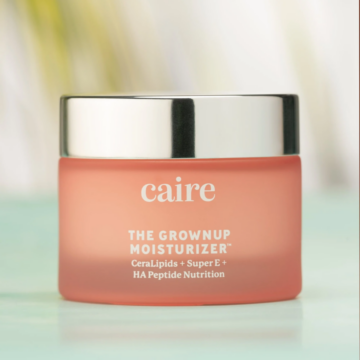
If you’re looking a more affordable option, you can easily find one online or on a local store shelf, such as CeraVe Daily Moisturizer for normal to dry skin. You get the benefits of hyaluronic acid and three ceramides (lipids) to restore and retain skin moisture.
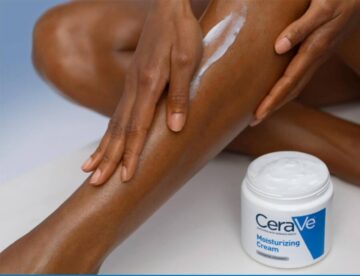
While many women think exfoliation might help get rid of dry skin, the doctors we spoke with recommend limiting this practice. Since during perimenopause and menopause skin gets thinner and more sensitive, taking off layers with exfoliation will only make the condition worse in the long run.
Seeking Medical Assistance For Dry, Itchy Skin During Menopause
Sometimes, the dry, itchy skin that occurs during menopause requires medical intervention.
Dr. Goldstein told us that women on hormone replacement therapy “typically demonstrate less itching as estrogen replacement can improve skin protein generation as well as lipid production.”
Dr. Ericsson agreed with her colleague about the potential benefits of hormone replacement therapy, including creams, patches, capsules, injections or pellets.
However, there can be health risks to hormone replacement therapy for some people, which is why it is important to speak with your doctor about whether or not this menopause treatment is right for you.
Why is skin itchy during menopause? And what to do about it originally appeared on Simplemost.com


